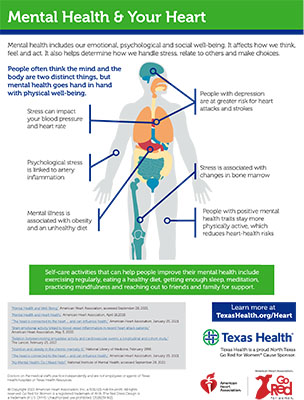People often think the mind and the body are two distinct things. In reality, mental health goes hand in hand with physical well-being, including heart health.
“There's a direct and close relationship between the two: Your mental struggles can actually increase your risk of heart problems and delay your recovery,” says Dr. Sreenivas Gudimetla, a cardiologist with Texas Health Heart and Vascular Specialists, a Texas Health Physicians Group practice in Fort Worth.
Cardiovascular disease is the leading cause of death among U.S. adults, and mental illnesses are common, too. Nearly one in five U.S. adults experience mental illness, a term that covers a range of conditions, including anxiety, depression, bipolar disorder and schizophrenia.
But why are mental illnesses linked so closely with heart disease?

Scientists have uncovered several possible reasons. First, people with mental illness are more likely to engage in risky health behaviors such as smoking and eating a high-calorie diet loaded with cholesterol and saturated fat, says Gudimetla.
“People with depression and anxiety also tend to exercise less, and they’re less compliant with medications,” he explains. “They might already be on several medications (for their mental health), and it’s a big challenge for them to take more medications for their cardiovascular disease.”
Researchers think mental illnesses have certain physiologic effects on the body — including high blood pressure, reduced blood flow to the heart and high cortisol levels — that lead to calcium buildup in the arteries and heart disease. Scientists also believe a heart attack, or a stroke, can prompt depression and anxiety in patients who struggle to cope with pain, fear of death, or disability or money problems caused by their sudden illness.
Different types of mental illnesses can trigger various heart problems. Anxiety and stress can set off takotsubo cardiomyopathy, more commonly known as “broken heart syndrome,” a sudden, intense chest pain caused by the surge of hormones after an emotional event.
“It could be the loss of a spouse, a house burning down, financial problems, you name it. We see it fairly often,” Gudimetla says. “The good news is that after a couple of weeks, the entire area of the heart that appeared to be damaged completely returns to normal.”
People with severe mental illnesses, such as clinical depression, bipolar disorder and schizophrenia, have a 10- to 25-year life expectancy reduction due partly to higher rates of high blood pressure, diabetes and cardiovascular disease.
Another obstacle is that people with severe mental illness are less likely to get proper treatment for heart issues, Gudimetla notes. That’s partly because they don’t seek treatment as often as people without psychological issues. But it’s also because medical professionals often aren’t trained to treat patients with mental illness.
“We're so busy putting people on medications and doing cardiac procedures that we often forget about the mental aspect of all this,” he adds.
The American Heart Association issued a scientific statement in 2021 urging doctors to assess the mental well-being of heart patients as part of their routine care and consider prescribing medication or psychotherapy.
“Clinicians should strive to treat not just the disease, but the person as a whole,” the statement said.
That’s a step in the right direction, but patients still need to be proactive about seeking mental health services. Nearly 60 percent of American adults with a mental illness don’t get treatment.
You are urged to contact a health care professional if you experience any of these symptoms for more than two weeks:
- Thoughts of death or self-harm
- Unable to perform usual daily functions
- Difficulty sleeping
- Struggling to get out of bed in the morning because of mood
- Appetite changes resulting in unwanted weight changes
- Difficulty concentrating
- Loss of interest in things you usually enjoy
Self-care activities that can help with mental illness include exercising regularly, eating a healthy diet, getting enough sleep, and reaching out to friends and family for support.
The stigma surrounding mental illness might not be as big as it was decades ago, but it still exists. Gudimetla says medical professionals, policymakers and the public need to work harder to de-stigmatize mental illness and promote the idea that the mind, heart and body are all interconnected.
“We need to increase the amount and quality of mental health services in our communities so patients really get the help they need,” he admits. “We still have a long way to go.”
Find a heart and vascular specialist today who can help you learn more about the connection between your mental health and heart health.

